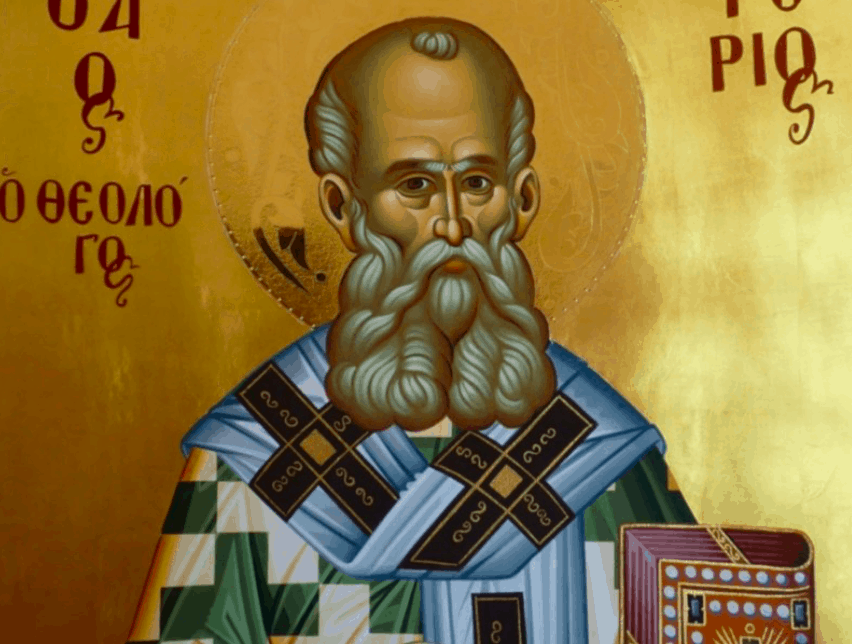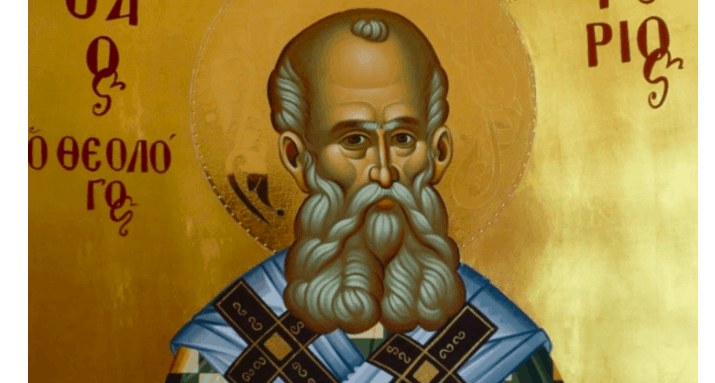
On January 25 the Greek Orthodox Chuch celebrates the Feast Day of Saint Gregory the Theologian and Archbishop of Constantinople, who was also one of the Three Holy Hierarchs, along with Saint Basil the Great and Saint John Chrysostom.
Saint Gregory the Theologian, Archbishop of Constantinople, a great Father and teacher of the Church, was born into a Christian family of eminent lineage in the year 329, at Arianzos (not far from the city of Cappadocian Nazianzos). His father, also named Gregory (January 1), was Bishop of Nazianzus. The son is the Saint Gregory Nazianzus encountered in Patristic theology. His pious mother, Saint Nonna (August 5), prayed to God for a son, vowing to dedicate him to the Lord. Her prayer was answered, and she named her child Gregory.
His parents, Gregory and Nonna, were of noble ancestry and respected by all; however, the elder Gregory, being the child of a pagan father and a Jewish mother, was not a Christian in his younger years. He belonged to the sect of the Hypsistarii, which combined heathen and Judaic error. The blessed Nonna was the daughter of Christians and was herself an Orthodox Christian from childhood. She was reared in piety and perfectly instructed in the fear of God, which is the beginning of all wisdom. Providence allowed her to be wed to an infidel, so that "the unbelieving husband" might be "sanctified by the" believing "wife," (1 Corinthians, Ch. 7), as the Apostle says. Nonna constantly exhorted her husband to accept the true faith, and what is more, fervently prayed for him. Eventually, her entreaties secured God's intervention. Although he did not know or wish to learn how to pray, her husband saw himself in a dream chanting the psalms of David, which he had never read before but had only heard his wife recite. The words he intoned were the following: "I was glad because of them that said unto me: let us go into the house of the Lord" (Psalm 121). As he chanted, sweet compunction filled his heart. He awoke rejoicing and told Nonna everything. She understood that God was calling her husband to His Holy Church, and began with even greater fervor to teach him about the Christian faith and urge him to the path of salvation. It so happened that Leontius Bishop of Caesarea in Cappadocia was passing through Nazianzus on his way to Nicaea, where the First Ecumenical Council was about to begin. The blessed Nonna took her husband to Leontius, who baptized him. After his baptism, Gregory led a God-pleasing life, as befits a true Christian. He so excelled in piety and good works that he later became Bishops of Nazianzus.
Living with such a man in honorable wedlock, Nonna naturally desired to bear him a son. She prayed to the Giver of all blessings, and even before conceiving promised, as once did Hannah, mother of Samuel, to dedicate her child to God (I Kings, Ch. 1). The Lord Who does "the will of them that fear Him" (Psalm 144) and hears "their supplication," fulfilled the request of that devout woman, revealing to her in a dream the birth of a son, the child's physical appearance, and his name: Gregory, after his father. Nonna thanked God from the depths of her heart and entrusted the child to providence, offering the fruit of prayer as a gift to the Lord; however, she did not have the babe baptized. In those days many Christians were not baptized as infants; instead, their initiation was deferred until they were thirty years old, the age at which Christ our Lord was baptized by John in the Jordan. Saint Gregory's Baptism was delayed until he reached that age, in accordance with the tradition. Subsequently, Gregory himself, Saint Basil the Great, Saint Gregory of Nyssa, and other Holy Fathers condemned this practice.
Saint Gregory was raised in accordance with Christian principles, learned to read and write while still very young, and grew in stature and wisdom. Attentive and diligent in his studies (as befitted one bearing the name Gregory (the name Gregory is derived from the Greek word for "vigilant'.), he surpassed in his intellectual achievements all his schoolmates. Youth did not hinder him from understanding subjects usually investigated only by those whose mental powers had reached their zenith. Childish games and pastimes held no attraction for him, and he utterly disdained spectacles of every kind, preferring to spend time wisely, pursuing his studies and striving for virtue.
Saint Basil the Great consecrated him bishop of Sasima, and the Emperor Theodosius quickly called him to the vacant Archiepiscopal Throne of Constantinople. His works were manifold, the best-known being his theological writings, for which he received the title "The Theologian". He is particularly famed for the depth of his Sermons on the Holy Trinity. He also wrote against the heretic Macedonius, who taught wrongly of the Holy Spirit ("that the Spirit was a creature of God"), and against Apollinarius who taught that "Christ did not have a human soul but that His Divinity was in place of His soul". He also wrote against the Emperor Julian the Apostate, his sometime schoolmate. In the year 381 A.D., when a quarrel broke out in the Council concerning his election as Archbishop, he withdrew himself, declaring: "Those who deprive us of the (Archiepiscopal)Throne cannot deprive us of God." He then left Constantinople and went to Nazianzus, remaining there is retirement, prayer, and the writing of instructive books until his death.
And, although he was in weak health all his life, he lived to the age of seventy.
Saint Gregory was buried at Nazianzos. In the year 950, his holy relics were transferred to Constantinople into the church of the Holy Apostles. Later on, a portion of his relics was transferred to Rome.
Today is also the Name Day of Grigorios, Grigoria.
Xronia Polla!


